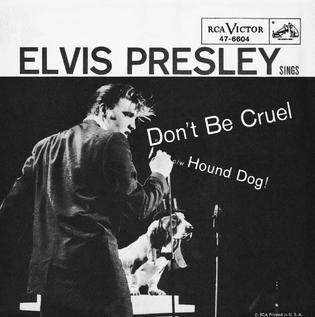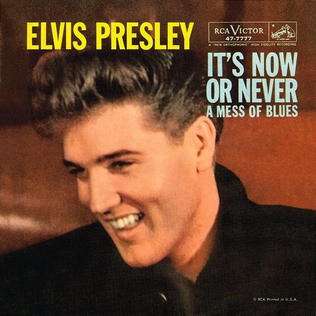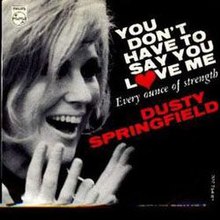
Mary Isobel Catherine Bernadette O'Brien, better known by her stage name Dusty Springfield, was an English singer. With her distinctive mezzo-soprano sound, she was a popular singer of blue-eyed soul, pop and dramatic ballads, with French chanson, country, and jazz in her repertoire. During her 1960s peak, she ranked among the most successful British female performers on both sides of the Atlantic. Her image – marked by a peroxide blonde bouffant/beehive hairstyle, heavy makeup and evening gowns, as well as stylised, gestural performances – made her an icon of the Swinging Sixties.

"Jailhouse Rock" is a rock and roll song recorded by American singer Elvis Presley for the film of the same name. It was written by Jerry Leiber and Mike Stoller. RCA Victor released the song on a 45 rpm single on September 24, 1957, as the first single from the film's soundtrack EP. It reached the top of the charts in the U.S. and the top 10 in several other countries. The song has been recognized by the Grammy Hall of Fame, the American Film Institute, and others.
Simon Robert Napier-Bell is an English record producer, music manager, author and journalist. At different times, he has managed artists as diverse as the Yardbirds, John's Children, Marc Bolan, Japan, London, Sinéad O'Connor, Ultravox, Boney M, Sinitta, Wham!, Blue Mercedes, Alsou and Candi Staton, among others.

"Don't Be Cruel" is a song that was recorded by Elvis Presley and written by Otis Blackwell in 1956. It was inducted into the Grammy Hall of Fame in 2002. In 2004, it was listed #197 in Rolling Stone's list of 500 Greatest Songs of All Time.

Giuseppe "Pino" Donaggio is an Italian musician, singer, and composer of film and television scores. A classically-trained violinist, Donaggio is known for his collaborations with director Brian De Palma, and for his work in both European and American genre cinema. He has won two Italian Golden Globe Awards, and has been nominated for two David di Donatello, four Golden Ciak, two Nastro d'Argento, and a Saturn Award.

The Sweet Inspirations are an American R&B girl group mostly known for their work as backup singers on studio recordings for other R&B and rock artists. A founding member of the group was Dionne Warwick, who was later replaced by her aunt, Cissy Houston.

"You Don't Know Me" is a song written by Eddy Arnold and Cindy Walker in 1955. "You Don't Know Me" was first recorded by Arnold that year and released as a single on April 21, 1956, on RCA Victor. The best-selling version of the song is by Ray Charles, who took it to number 2 on the Billboard Hot 100 chart in 1962, after releasing the song on his number 1 album Modern Sounds in Country and Western Music. The first version of the song to make the Billboard charts was by Jerry Vale in 1956, peaking at number 14 on the pop chart. Arnold's version charted two months later, released as an RCA Victor single, 47–6502, backed with "The Rockin' Mockin' Bird", which reached number 10 on the Billboard country chart. Cash Box magazine, which combined all best-selling versions at one position, included a version by Carmen McRae that never appeared in the Billboard Top 100 Sides listing.

"I Just Don't Know What to Do with Myself" is a song written by Burt Bacharach and lyricist Hal David.

Myrna Joy "Jody" Miller was an American singer, who had commercial success in the genres of country, folk and pop. She was the second female artist to win a country music accolade from the Grammy Awards, which came off the success of her 1965 song "Queen of the House". By blending multiple genres together, Miller's music was considered influential for other music artists.

"Don't" is a song recorded by Elvis Presley and released in 1958. Written and produced by Jerry Leiber and Mike Stoller, it was Presley's eleventh number-one hit in the United States. "Don't" also peaked at number four on the R&B charts. Billboard ranked the ballad as the No. 3 song for 1958.

You Don't Have to Say You Love Me is the fourth album of singer Dusty Springfield to be released in the USA, issued on the Philips Records label in 1966. The album was more or less a retitled re-issue of Springfield's British album Ev'rything's Coming Up Dusty, recorded and released in 1965, with the addition of the two hit singles "You Don't Have To Say You Love Me" and "Little By Little", both released in 1966. In fact, Ev'rything's Coming Up Dusty had been released in the US a few months prior, but as the title track of You Don't Have to Say You Love Me became a huge hit single for Springfield, Philips USA decided to repackage and retitle the album after the single.
Vicki Heather Wickham is an English talent manager, entertainment producer, and songwriter.

Away We a Go-Go is a 1966 album by Smokey Robinson & the Miracles. The album features the singles "(Come 'Round Here) I'm the One You Need", a Billboard top 20 Pop hit, written and produced by Holland-Dozier-Holland; and "Whole Lot of Shakin' in My Heart ", written and produced by Frank Wilson. The album uses a different take of "I'm the One You Need" than what was issued on the single. A third single was planned for release from this album, the tune "More, More, More ", cataloged as Tamla T-54005, but the single was never released. It was later covered by the regional group Bob Brady and The Con Chords. Another single from this album, the Stevie Wonder/Ivy Jo Hunter composition of "Can You Love a Poor Boy", was released to radio stations as a special Disc Jockey Advanced Single, Tamla T-540, but was never given an official catalog number for general release. It too, inspired cover versions by Gil Bernal and Ronnie Walker.

"It's Now or Never" is a song recorded by Elvis Presley and released as a single in 1960. The song is one of the best-selling singles by Presley, and one of the best-selling physical singles of all time. It was recorded by Bill Porter at RCA Studio B in Nashville. It is written in E major and has a tempo of 80 BPM.
Luther Dixon was an American songwriter, record producer, and singer. Dixon's songs achieved their greatest success in the 1950s and 1960s, and were recorded by Elvis Presley, the Beatles, the Jackson 5, B.B. King, Jerry Lee Lewis, Dusty Springfield, Jimmy Reed and others. As a producer, Dixon helped create the signature sound of the girl group the Shirelles.

The singles discography of Elvis Presley began in 1954 with the release of his first commercial single, "That's All Right". Following his regional success with Sun Records, Presley was signed to RCA Victor on November 20, 1955. Presley's first single with RCA, "Heartbreak Hotel", was a worldwide hit, reaching the No. 1 position in four countries and the top 10 in many other countries. Other hit singles from the 1950s include "Don't Be Cruel", "Hound Dog", "Love Me Tender", "Too Much", "All Shook Up", "(Let Me Be Your) Teddy Bear", "Jailhouse Rock", "Don't", "Hard Headed Woman" and "A Big Hunk o' Love". On March 24, 1958, Presley entered the United States Army at Memphis, Tennessee, and was stationed in Germany. He left active duty on March 5, 1960.

My Happiness is a studio album by French singer Amanda Lear, released on March 17, 2014 by the independent label Boomlover. The album is a tribute to Elvis Presley.
"Please Don't Stop Loving Me" is a song first recorded by Elvis Presley as part of the soundtrack for his 1966 motion picture Frankie and Johnny.
Butterscotch were an English soft rock band which consisted of Chris Arnold, David Martin and Geoff Morrow, who are also known collectively as the songwriting and record production trio Arnold, Martin and Morrow. They are best known for their top 20 UK and Ireland hit, "Don't You Know ".














